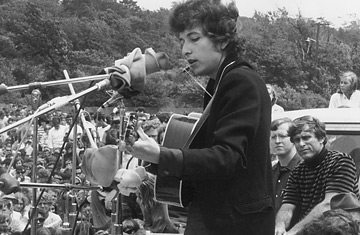
Bob Dylan performing at the Newport Folk Festival, 1965.
Director: Murray Lerner
Columbia
Performance Series/Sony
Available Oct. 30, List Price $19.98
Just one way the youthful Dylan proved his protean iconoclasm was the way he'd invent or intervene in a musical genre, then abandon it for something else. This filmed compilation of his sessions at three consecutive Newport Folk Festivals show the morphings. It's a crucial record of this magnificent bard in his most fertile period — and an excellent basis of comparison for Todd Haynes' Dylan-fantasia movie I'm Not There, which hits theaters Nov. 21.
In 1963 Dylan is the voice of political protest, performing "Only a Pawn in Their Game," "Who Killed Davey Moore?", "With God on Our Side" ("If God is on our side / He'll stop the next war") and, backed by Pete Seeger, Joan Baez, the Freedom Singers and Peter Paul & Mary, the peace anthem "Blowin' in the Wind." By 1964 he's dropped politics for poetic introspection ("Mr. Tambourine Man") and romantic put-downs ("It Ain't Me, Babe"). The audience is so warm for Dylan, they keep chanting, roaring for him to return after his set ends. He bounds briefly back on stage, all smiles. "I wanna say thank you, I love you."
The following summer he's such a star he is eclipsing the older traditionalists. Hundreds of fans besiege the car Dylan was in, as he smiles wanly and says, "They're all my friends." But there is rebellion among some of his fans. A young man interviewed by Lerner sneers: "Everybody is, 'There he is, there's the man-god.' Who needs him any more? He's accepted, he's part of your establishment, and forget him." When he takes the stage with an electrified band and plays a loud "Maggie's Farm," the boos drown out the cheers. Then he does "Like a Rolling Stone" (the week the song was released as a single) and gets more catcalls. He walks off and has to be coaxed back by a perturbed Peter Yarrow, who tries to calm the crowd by saying Dylan is getting his acoustic guitar. A rendition of "Mr. Tambourine Man" calms and beguiles the audience. It's his first in 40 years of Greatest Hits performances.
The crowd was wrong, of course, and Dylan was right, about folk rock and "Like a Rolling Stone." Forty years later, Rolling Stone magazine chose it as the greatest of all rock songs. But the folkies were right about how a counterculture hero can go commercial. Dylan has been assiduously marketing his past with an autobiography and the Martin Scorsese documentary No Direction Home. And accompanying this disc is a brochure peddling "Official Bob Dylan Ringtones" from 15 of his signature songs. Perhaps this will be followed by Hummel likenesses of Hattie Carroll, Davey Moore and Medgar Evers: the Bob Dylan Civil Rights Icons Figurine Set. Get em while they last.